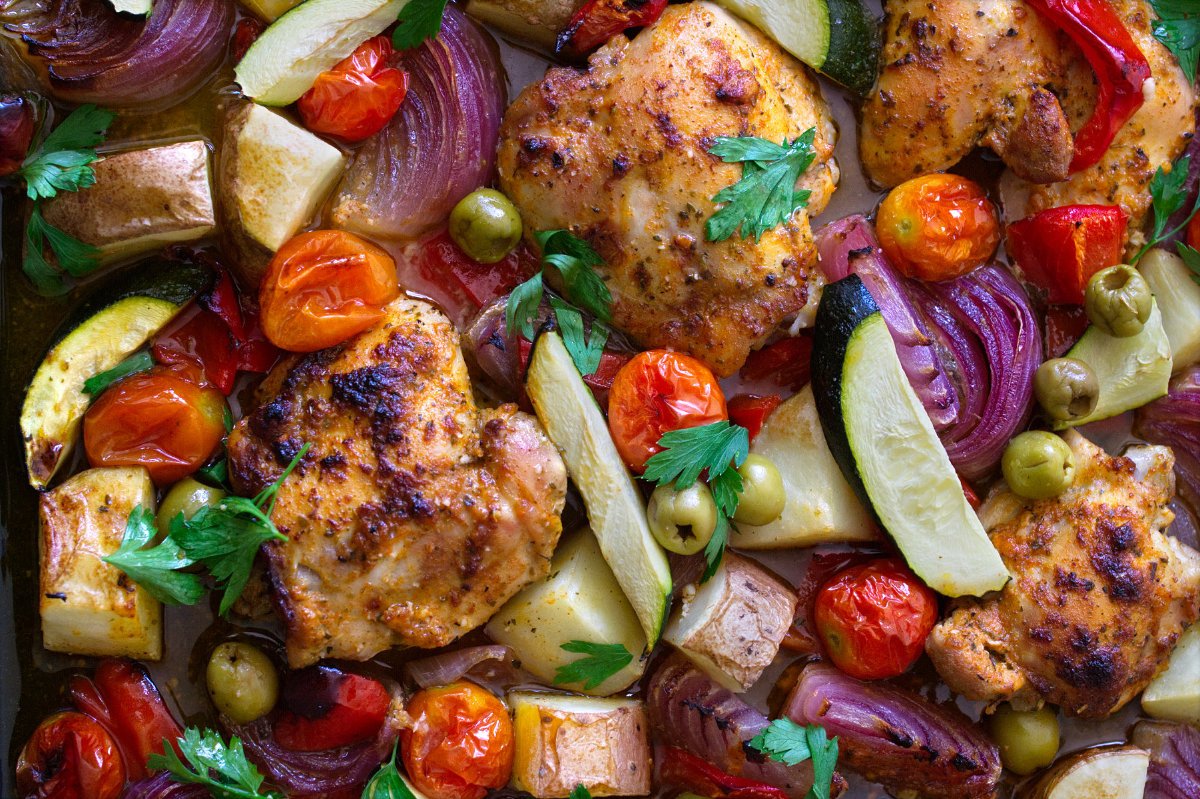Healthy baked Mediterranean chicken thighs is a recipe that’s sure to become a regular dinner option. This is a simple recipe to prepare and requires very little effort for maximum Mediterranean flavor. I recommend marinating the chicken for at least 8 hours so plan ahead if you can. You can marinate them for just a couple of hours though if you want to make it on the night, and for 30 minutes minimum so can become a midweek dinner option.
This is how easy it is: Simply marinate your chicken thighs, bake with some veg in a sheet pan, and serve.
Table of contents:
How to Make Healthy Baked Mediterranean Chicken Thighs
Ingredients
For the marinade
- 5 tbsp Extra Virgin Olive Oil
- 2 tbsp Lemon juice
- 2 Garlic cloves, minced
- 1 tbsp Dijon Mustard
- 1 tsp Dried Oregano
- 1 tsp Garlic powder (optional)
- 1 tsp Spanish La Vera Sweet Paprika
- ½ tsp White Pepper
- Salt (to taste)
For the Chicken
- 28 oz. (800g) chicken thighs
- 2 small red onions, cut into wedges
- 1 large potato
- 1 red bell pepper
- 1 cup cherry tomatoes
- 1 large courgette
- ¼ cup Pitted olives
- 1 cup chicken stock (warmed)
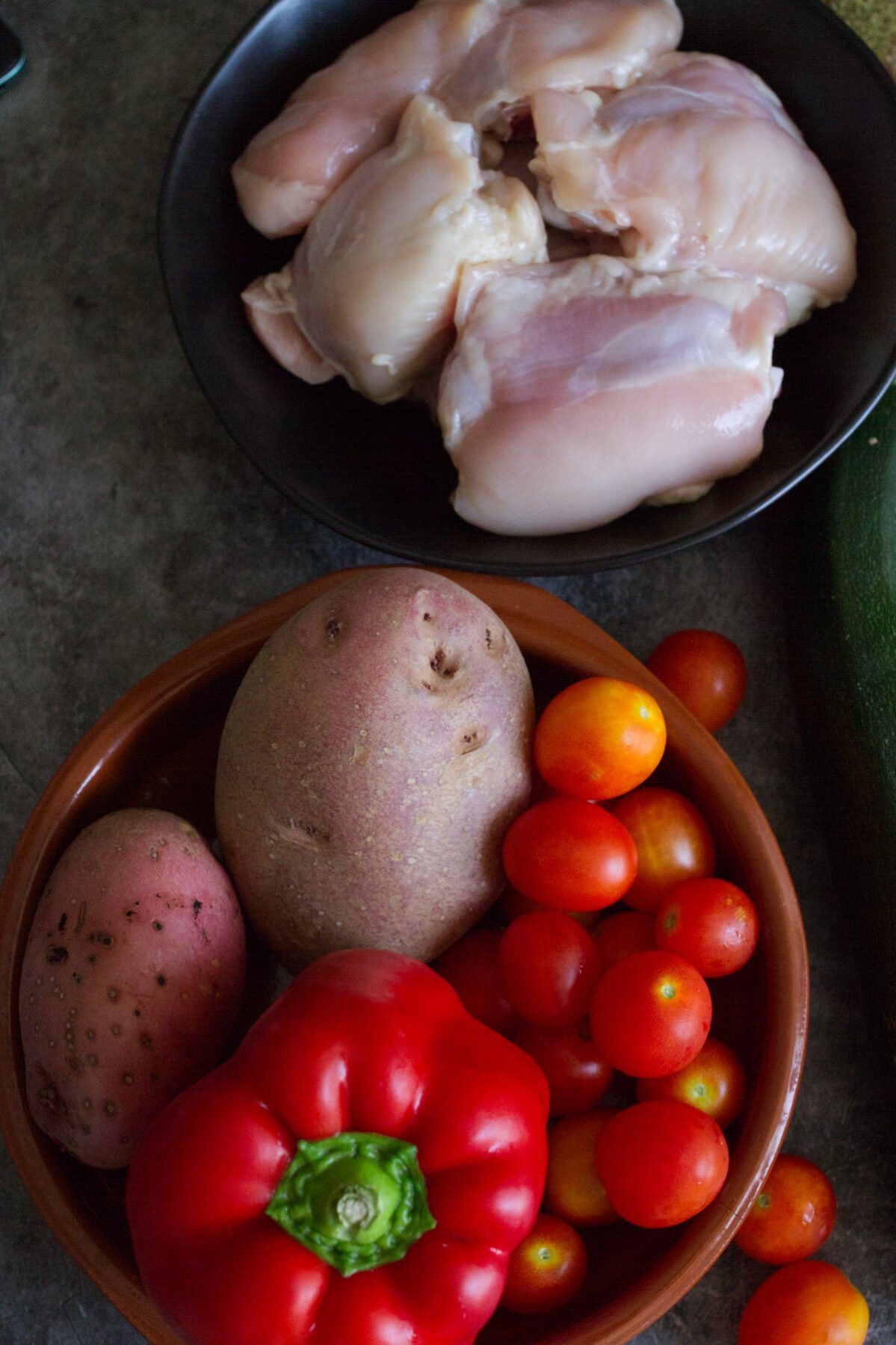
Equipment Needed
- Chef Knife and cutting board
- Large Glass bowl
- Plastic Food Wrap
- Large baking sheet
- Oven
- Cooking tongs
Instructions:
- Make marinade in a large bowl
- Add chicken thighs to the marinade and coat evenly. Cover and marinate overnight or for at least 30 minutes.
- Preheat oven to 180°C/350°F
- Add chicken thighs, red bell pepper, onion, and potato to a large sheet pan or casserole dish
- Pour in warmed chicken stock.
- Drizzle any remaining marinade over the ingredients.
- Bake for 15 minutes then carefully remove the sheet pan from the oven.
- Baste chicken with cooking juices and add the cherry tomatoes and courgette.
- Drizzle with a little olive oil and season to taste with salt and pepper.
- Bake for another 20 minutes or until the chicken is golden.
- Serve alongside some steamed rice and your favorite garden salad for a healthy, nutritious, and balanced meal.
Cooking Notes:
- Sheet Pan Size: We suggest using a large baking sheet with sides around 1 inch deep (here’s an example: Baking Sheet Pan 2 Pack, 9 x 13 inches).
- Veggie Prep: Veggies should be cut into even sized pieces so they cook at the same speed. Aim for bite-sized pieces around 1-2 inches (2-4 cm).
- Chicken: This recipe is great with the dark meat from the chicken thighs, but you can make it with other cuts of chicken, you’ll just need to adjust the cooking times of the chicken as follows:
- – Boneless skinless thigh fillets: Add the chicken into the pan 20 minutes into the baking time. This gives the veggies time to soften and cook without overcooking the chicken.
- – Chicken breast: Score the chicken breasts with 1-inch deep marks before cooking, this will help them cook (and marinate faster). Add the chicken for the last 20 minutes of baking time.
- Marinating: We highly recommend marinating for at least 3-4 hours, and overnight is ideal. However, if you’re short on time, a quick 30-minute marinate can work well too (see notes below on marinating times).
- We use a 3:1 oil-to-acid ratio when marinating chicken. The oil-to-acid ratio is a critical element in marinades and cooking as it balances flavors and ensures proper marination (see more on this below in the recipe article).
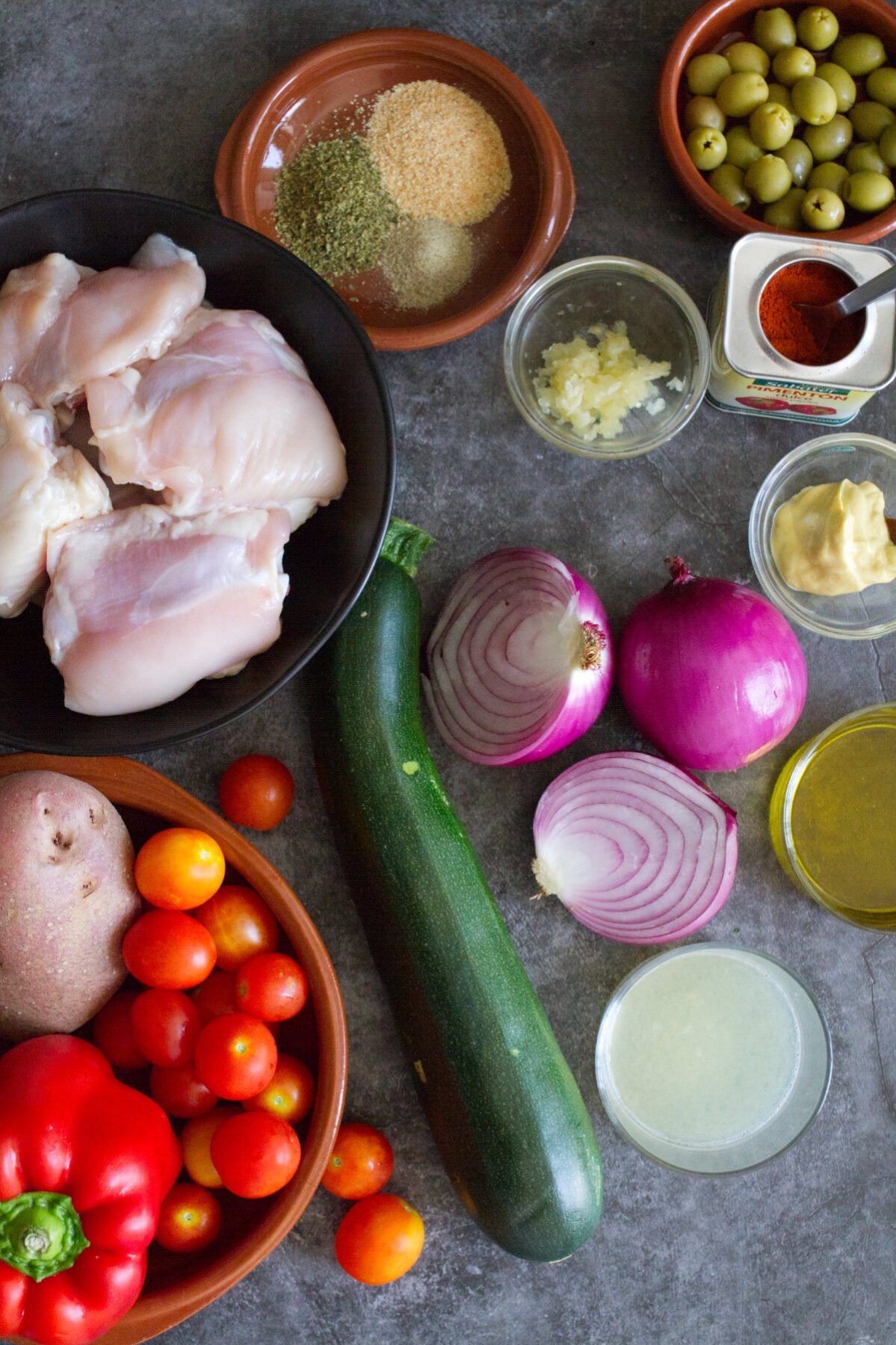
How Healthy is This Chicken Recipe?
A healthy chicken recipe typically includes lean chicken breast or thigh, prepared with minimal added fats and a focus on wholesome, nutrient-dense ingredients. The beauty of sheet pan recipes is you can use any veg you like.
When it comes to the best cut of chicken to use, we love the flavor of chicken thighs, and there’s one simple trick to choosing the healthiest chicken thighs.
Skinless Chicken Thighs
Removing the skin significantly reduces the saturated fat content. While the fat in chicken skin is primarily unsaturated, it also contains some saturated fat, which can contribute to increased cholesterol levels if consumed in excess.
Another healthy reason to choose skinless chicken thighs over the skin-on variety is calorie control: Skinless thighs have fewer calories compared to their skin-on counterparts, making them a better choice for those looking to manage their weight.
Health Benefits:
- Lean Protein: Chicken breast is a great source of lean protein, which is essential for muscle repair and growth.
- Healthy Fats: Olive oil, and in particular extra virgin olive oil is rich in heart-healthy monounsaturated fats.
- Vitamins and Minerals: Fresh herbs and lemon provide vitamins, antioxidants, and a boost of flavor without adding extra calories.
- Low Calorie: Grilling or roasting chicken thighs keeps the calorie count low while retaining a delicious taste.
Eat Seasonal Veggies
Eating seasonal vegetables offers numerous benefits for your health, the environment, and your wallet. Here are some key reasons to include seasonal veggies in your diet:
Nutritional Benefits:
- Higher Nutrient Content: Seasonal vegetables are typically harvested at their peak ripeness, which means they are fresher and have higher levels of vitamins, minerals, and antioxidants compared to out-of-season produce that might be harvested early and transported long distances.
- Fresher is Better: When vegetables are in season, they are fresher and taste better, which can make healthy eating more enjoyable and satisfying.
Seasonal veg are cheaper:
- Lower Cost: Seasonal vegetables are usually more abundant and have lower production and transportation costs, which translates to lower prices for consumers. Eating in season can help you save money on groceries.
- Support Local Farmers: Purchasing seasonal produce often means buying from local farmers’ markets or local grocery stores, which supports the local economy and small-scale farmers.
Environmental Benefits:
Sustainable Farming: Seasonal farming practices are often more sustainable as they align with the natural growing cycles of the region, which can reduce the need for chemical interventions like pesticides and fertilizers.
Reduced Carbon Footprint: Seasonal vegetables often require less transportation and storage, reducing the carbon footprint associated with long-distance shipping and refrigeration. This helps to lower greenhouse gas emissions and energy consumption.
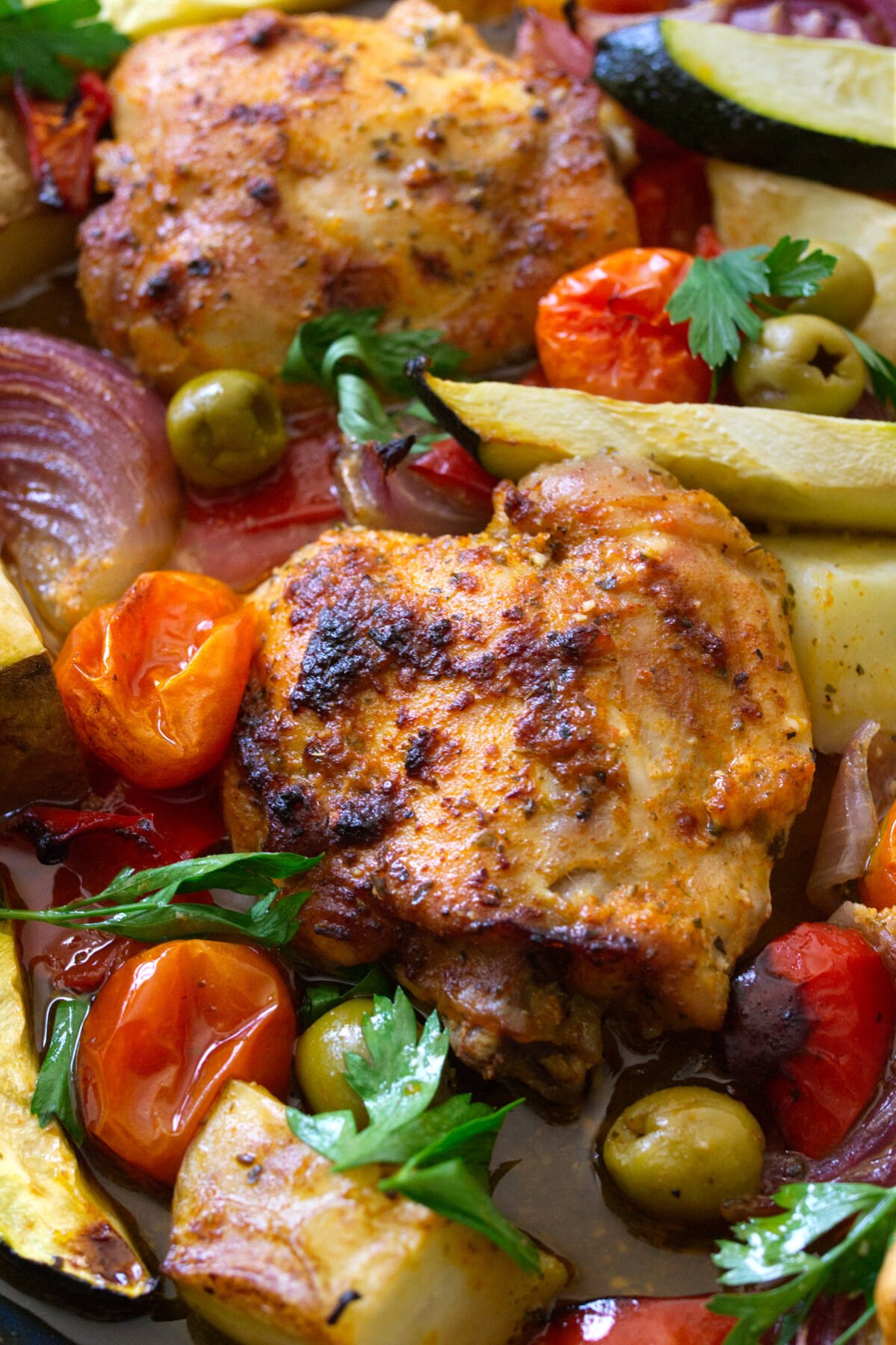
Marinate Chicken Thighs
The optimal marination time for chicken thighs can vary depending on the marinade ingredients and the desired flavor intensity. Here are some general guidelines:
Basic Marination Times
- Quick Marination:
- 15 to 30 minutes: If you are short on time, even a quick marination can impart some flavor and moisture to the chicken thighs. This is suitable for marinades that are primarily based on oil and herbs or mild acids like yogurt or buttermilk.
- Standard Marination:
- 2 to 4 hours: This is the most common marination time for chicken thighs. It allows enough time for the flavors to penetrate the meat without risking a change in texture. Marinades with a moderate amount of acid like this recipe (vinegar, lemon juice, wine) are suitable for this duration.
- Extended Marination:
- Overnight (8 to 12 hours): For maximum flavor absorption, marinating chicken thighs overnight is ideal. This is particularly useful for thicker cuts of chicken. However, be cautious with highly acidic marinades (containing lots of citrus or vinegar), as prolonged exposure can break down the proteins too much, resulting in a mushy texture.
Use the Right Container to Marinate Food
Marinating food can enhance its flavor and tenderness, but choosing the right container is essential to ensure safety and maximize the effectiveness of the marinade. Here’s what you need to know about choosing the appropriate container for marinating:
- Glass Containers:
- Benefits: Non-reactive, won’t absorb odors or stains, easy to clean.
- Best For: Any type of marinade, especially acidic ones (like those with vinegar, lemon juice, or wine).
- Examples: Glass bowl, baking dish, or Glass Bowl with Locking Lid
- Silicone Marinating Bags
These types of bags are made out of durable reusable silicone that is watertight and flexible. They’re a great choice for marinating and freezing food as they are inexpensive and can be washed and reused over and again.
Example: Dishwasher Safe Reusable Bags Silicone
- Food-Grade Plastic Containers:
- Benefits: Lightweight, durable, and available in various sizes.
- Best For: Marinating large quantities of food.
- Examples: BPA-free plastic storage containers, Ziploc bags.
- Tip: Ensure the plastic is labeled food-grade and is BPA-free to avoid chemical leaching.
- Stainless Steel Containers:
- Benefits: Durable, non-reactive, and easy to clean.
- Best For: Marinating with any type of ingredients.
- Examples: Stainless steel food storage containers
Containers to Avoid
Aluminum Containers:
Reason: Reactive with acidic ingredients, which can cause a metallic taste and discoloration.
Non-Food Grade Plastics:
Reason: Potential for chemical leaching into the food, especially with acidic marinades.
Copper Containers:
Reason: Highly reactive with acidic ingredients, which can lead to a metallic taste and potential toxicity.
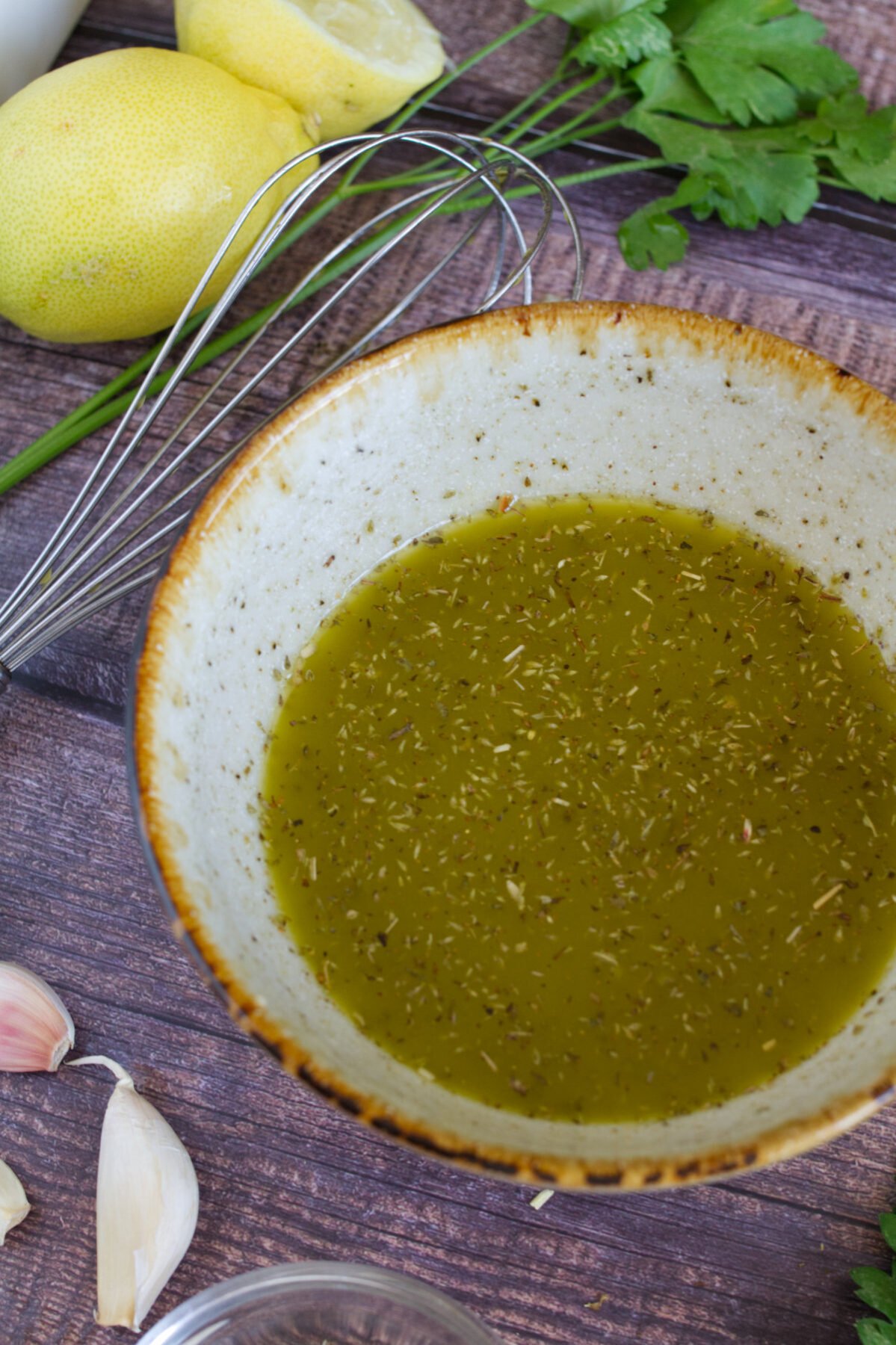
What is the Oil-To-Acid Ratio With Marinades?
The oil-to-acid ratio is a critical element in marinades and cooking as it balances flavors and ensures proper marination. The general guideline for most marinades and vinaigrettes is a 3:1 ratio of oil to acid. Here’s a detailed breakdown of how this ratio works in different contexts:
Marinades Use 3:1 Oil-To-Acid Ratio
For marinades, the oil-to-acid ratio helps to achieve the following:
- Tenderize: The acid (vinegar, citrus juice, wine, etc.) helps to break down proteins in meat, making it more tender. This recipe uses freshly squeezed lemon juice for this component of the ratio.
Flavor: The oil carries fat-soluble flavors and helps distribute the acidic components more evenly. I use extra virgin olive oil for its strong flavor and renowned health benefits. Let me know how yours turns out in the comments below. Happy cooking!
More marinated chicken recipes
- Mediterranean Chicken with a Tangy Olive Oil and Lemon Marinade
- 4 Greek Marinade Recipes + Marinating Times and Tips From a Mediterranean Kitchen
- Easy 5-Ingredient Mediterranean Chicken Marinade
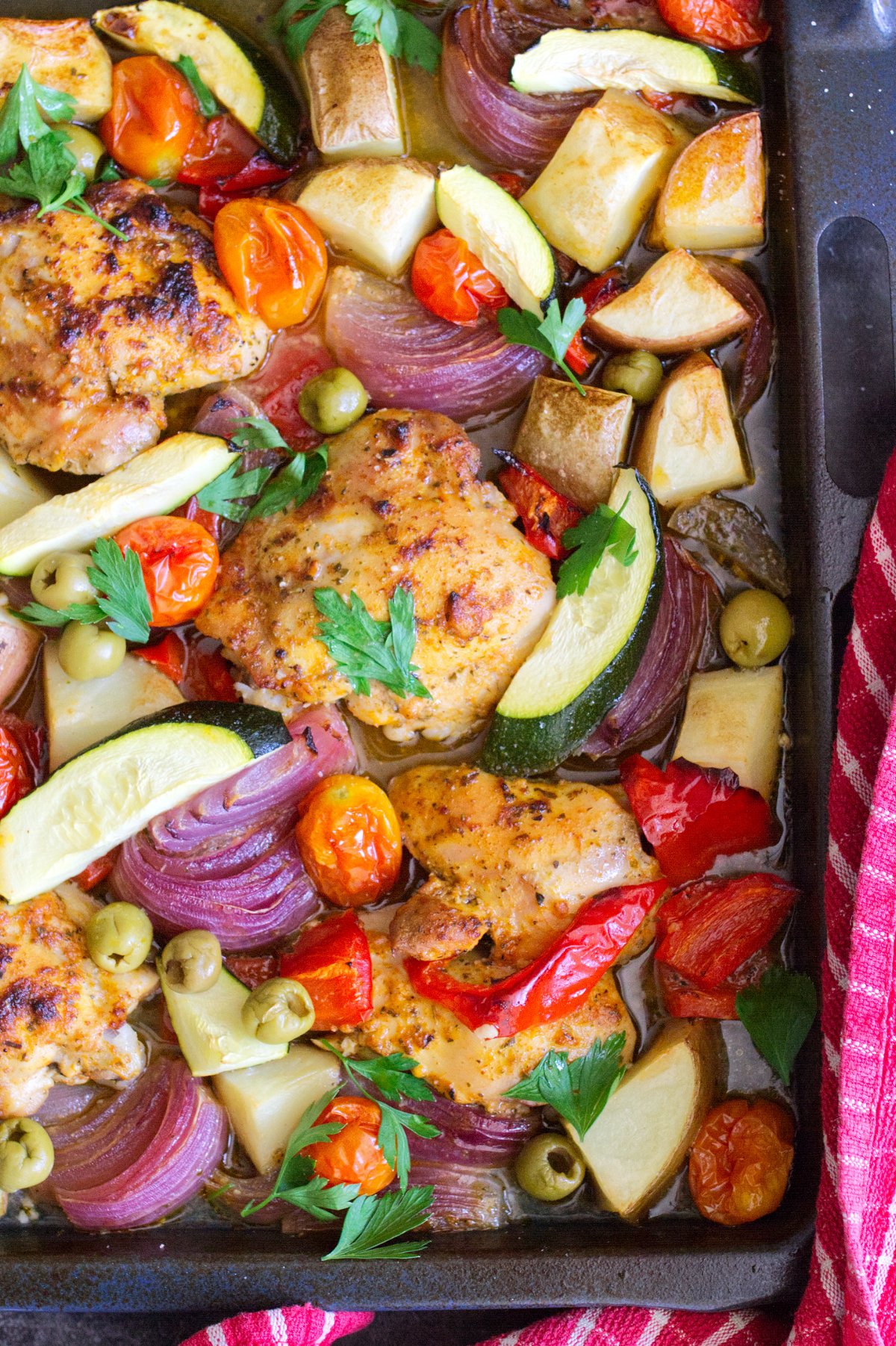
Nutrition Facts
| Servings: 4 | |
| Amount per serving | |
| Calories | 389 |
| % Daily Value* | |
| Total Fat 23.8g | 31% |
| Saturated Fat 5.6g | 28% |
| Cholesterol 113mg | 38% |
| Sodium 569mg | 25% |
| Total Carbohydrate 21g | 8% |
| Dietary Fiber 4g | 14% |
| Total Sugars 6.6g | |
| Protein 26.9g | |
| Vitamin D 0mcg | 0% |
| Calcium 64mg | 5% |
| Iron 2mg | 9% |
| Potassium 901mg | 19% |
| *The % Daily Value (DV) tells you how much a nutrient in a food serving contributes to a daily diet. 2,000 calorie a day is used for general nutrition advice. | |
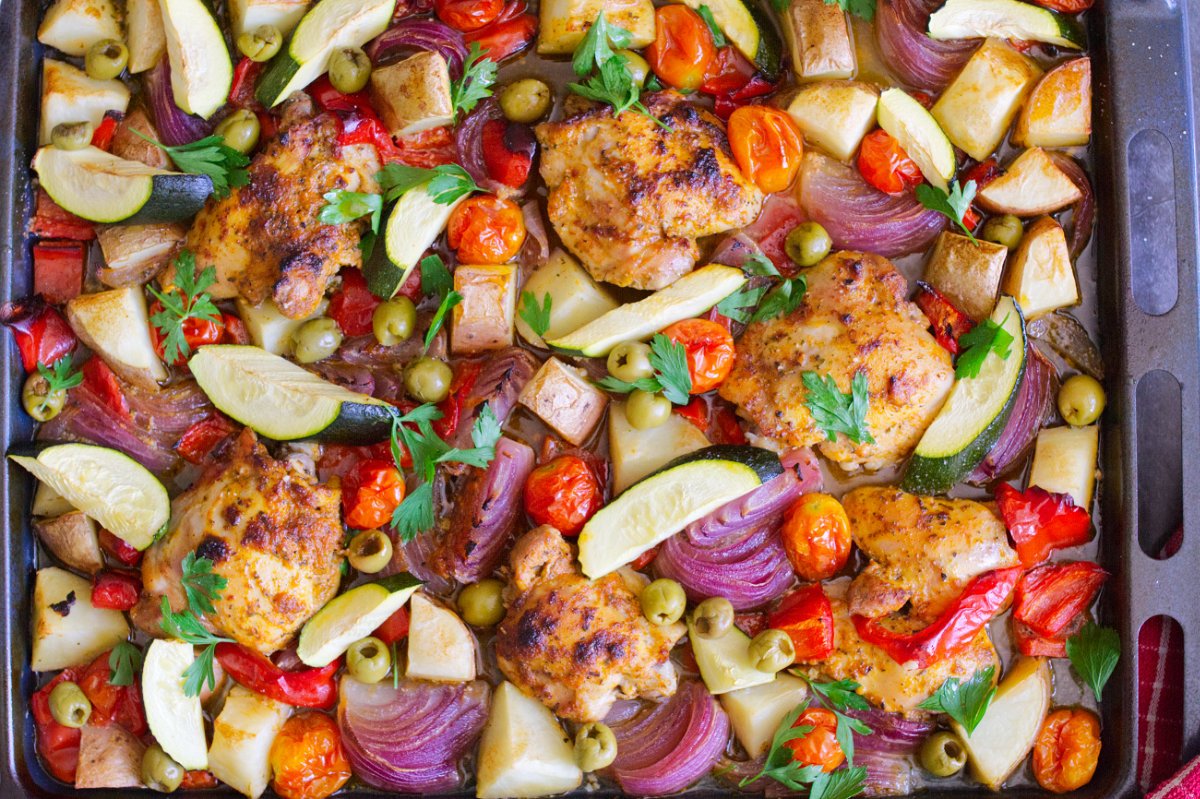
More Mediterranean Chicken Recipes:
- Healthy Mediterranean Chicken in a Tangy Lemon, Oil, and Herb Marinade
- Baked Mediterranean Chicken Thighs
- Pan-fried Greek Chicken Souvlaki With Creamy Tzatziki Sauce
- Za’atar Chicken with Leek, Artichoke Hearts, and Kalamata Olives
- One-pan Greek Chicken thighs with roast veg
- Mediterranean Chicken Meatballs with Couscous and a Tangy Greek Yogurt Dressing
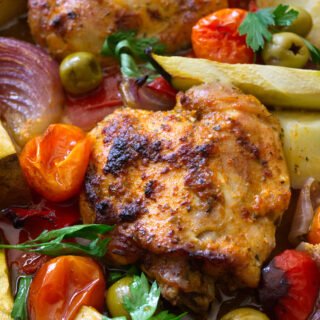
Healthy Baked Mediterranean Chicken Thighs | Easy Sheet Pan Recipe
Equipment
- Chef Knife and cutting board
- large glass bowl
- Plastic food wrap
- Large baking sheet
- Oven
- Cooking tongs
Ingredients
For the marinade
- 5 tbsp Extra Virgin Olive Oil
- 2 tbsp Lemon juice
- 2 Garlic cloves minced
- 1 tbsp Dijon Mustard
- 1 tsp Dried Oregano
- 1 tsp Garlic powder optional
- 1 tsp Spanish La Vera Sweet Paprika
- ½ tsp White Pepper
- Salt to taste
For the Chicken
- 28 oz. 800g chicken thighs
- 2 small red onions cut into wedges
- 1 large potato
- 1 red bell pepper
- 1 cup cherry tomatoes
- 1 large courgette
- ¼ cup Pitted olives
- 1 cup chicken stock warmed
Instructions
- Make marinade in a large bowl5 tbsp Extra Virgin Olive Oil, 2 tbsp Lemon juice, 2 Garlic cloves, 1 tbsp Dijon Mustard, 1 tsp Dried Oregano, 1 tsp Garlic powder, 1 tsp Spanish La Vera Sweet Paprika, ½ tsp White Pepper, Salt
- Add chicken thighs to the marinade and coat evenly. Cover and marinate overnight or for at least 30 minutes.28 oz. 800g chicken thighs
- Preheat oven to 180°C/350°F
- Add chicken thighs, red bell pepper, onion, and potato to a large sheet pan or casserole dish2 small red onions, 1 large potato, 1 red bell pepper
- Pour in warmed chicken stock.1 cup chicken stock
- Drizzle any remaining marinade over the ingredients.
- Bake for 15 minutes then carefully remove the sheet pan from the oven.
- Baste chicken with cooking juices and add the cherry tomatoes, olives, and courgette.1 cup cherry tomatoes, 1 large courgette, ¼ cup Pitted olives
- Drizzle with a little olive oil and season to taste with salt and pepper.
- Bake for another 20 minutes or until the chicken is golden.
- Serve alongside some steamed rice and your favorite garden salad for a healthy, nutritious, and balanced meal.
Video
Notes
Cooking Tips:
- Sheet Pan Size: We suggest using a large baking sheet with sides around 1 inch deep (here’s an example: Baking Sheet Pan 2 Pack, 9 x 13 inches).
- Veggie Prep: Veggies should be cut into even sized pieces so they cook at the same speed. Aim for bite-sized pieces around 1-2 inches (2-4 cm).
- Chicken: This recipe is great with the dark meat from the chicken thighs, but you can make it with other cuts of chicken, you’ll just need to adjust the cooking times of the chicken as follows:
- Boneless skinless thigh fillets: Add the chicken into the pan 20 minutes into the baking time. This gives the veggies time to soften and cook without overcooking the chicken.
- Chicken breast: Score the chicken breasts with 1-inch deep marks before cooking, this will help them cook (and marinate faster). Add the chicken for the last 20 minutes of baking time.
- Marinating: We highly recommend marinating for at least 3-4 hours, and overnight is ideal. However, if you’re short on time, a quick 30-minute marinate can work well too (see notes below on marinating times).
- We use a 3:1 oil-to-acid ratio when marinating chicken. The oil-to-acid ratio is a critical element in marinades and cooking as it balances flavors and ensures proper marination (see more on this below in the recipe article).

